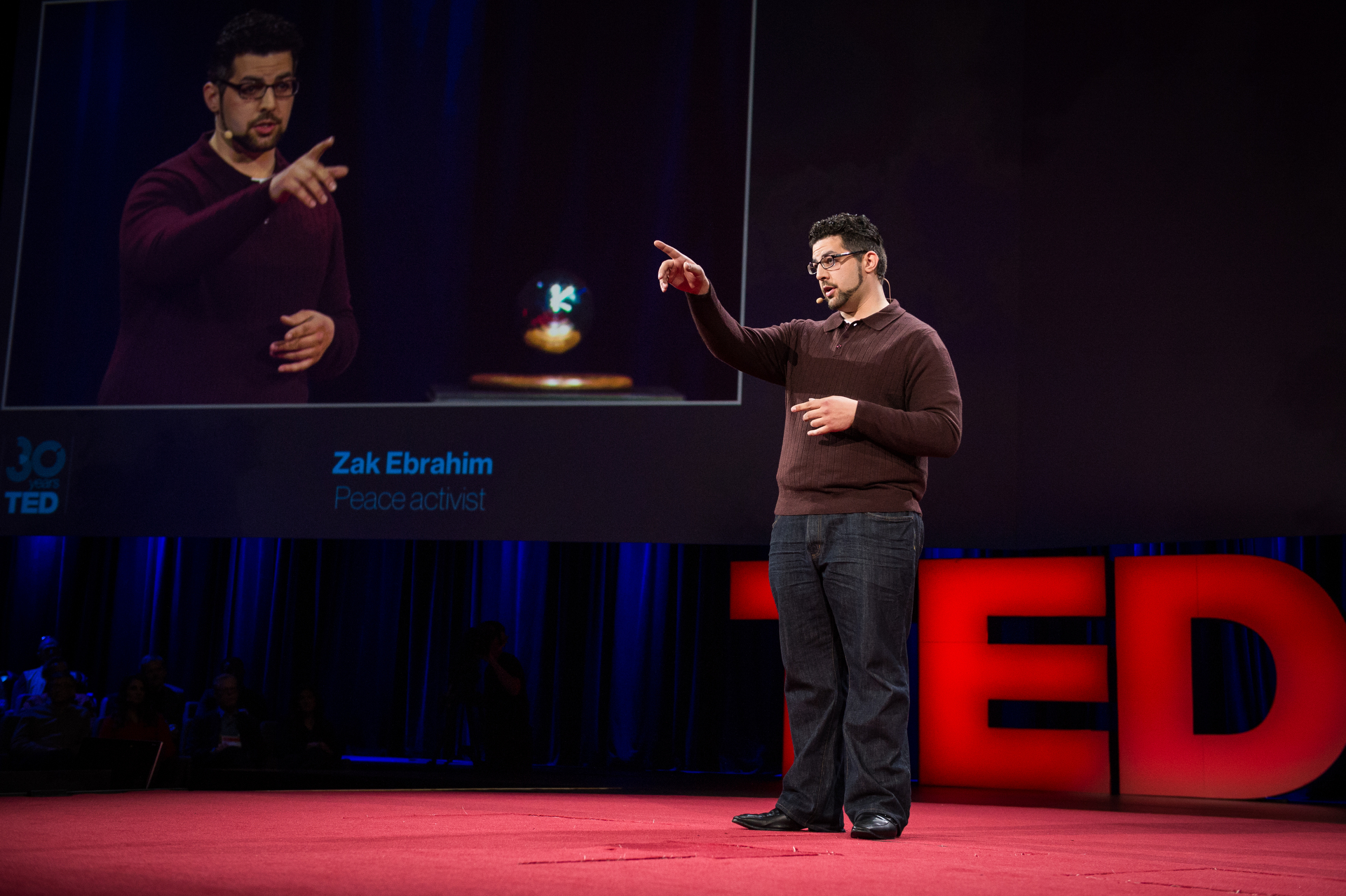Throughout Zak Ebrahim’s childhood, his father — El-Sayed Nosair — planned terrorist attacks on a dozen New York City landmarks, including tunnels, synagogues and the 1993 bombing of the World Trade Center in New York. On November 5, 1990, when Ebrahim was 7 years old, his father shot and killed Rabbi Meir Kahane, the then-leader of the Jewish Defense League.
“In every religion, in every population, you’ll find a small group of people who hold so fervently to their beliefs that they’ll use any means necessary to make others see them,” he says in his talk at TED2014. “My father exposed me to a side of Islam that few people, including the majority of Muslims, get to see.”
A few months prior to El-Sayed Nosair’s arrest for the World Trade Center attack, Ebrahim’s father took 7-year-old Ebrahim and a group of others to a local shooting range for target practice. “When it was my turn to shoot,” Ebrahim says, “… the last bullet that I shot hit the small orange light that sat on top of the target, and to everyone’s surprise, especially mine, the entire thing burst into flames … My uncle turned to the other men and in Arabic said, ‘Like father, like son.’” The whole group began to laugh. “It wasn’t until a few years later that I fully understood what they thought was so funny,” he says. “They thought they saw in me the same destruction my father was capable of.”
“Those men would eventually be convicted of placing a van filled with 1,500 pounds of explosives into the sub-level parking lot of the World Trade Center’s north tower,” Ebrahim says. “These were the men I looked up to. These were the men I called ‘ammu’ — ‘uncle.’”
In the wake of this destruction, Ebrahim struggled in many ways — one of them trying to fit in with other kids his age. “Growing up in this bigoted household, I wasn’t prepared for the real world,” he says. “I had been raised to judge people based on race or religion,” he says. Due to death threats and harassment toward his family, by the time Ebrahim was 19, he and his mother had already moved 20 times. “Each time I’d find one or two people I began to feel comfortable around, it was time to pack up and move to the next town.”
But being out in the world without his father taught Ebrahim to challenge the beliefs with which he was raised. A summer job at an amusement park, volunteering at a youth leadership conference and — ironically, he says — The Daily Show, opened his eyes to life outside of radicalism. He began to meet people and make friends with people from different backgrounds than his — those of different religions, races, cultures, sexual orientations. In this new life, he was exposed to all that from which he was sheltered.
A single conversation with his mother was the nexus of a turning point for Ebrahim. One day, when spending time with his mother, Ebrahim says, “My mother looked at me with the weary eyes of someone who had experienced enough dogmatism to last a lifetime and said, ‘I’m tired of hating people.’ I realized how much negative energy it takes to hold that hatred inside of you,” he said. He wanted this to end.
“Zak Ebrahim is not my real name,” he says. He and his mother both changed their names in an effort to separate themselves from his father. “So, why would I out myself and potentially put myself in danger?” he asks. “I do it in the hope that perhaps someone someday who is compelled to use violence may hear my words and my story and realize that there is a better way; so that I can show people that even though I’d been subjected to this violent, intolerant ideology, I did not become fanaticized. That if I can choose a better path, then anyone can. I choose to use my experience to fight back against terrorism, against bigotry. I do it for the victims of terrorism and their loved ones, for the terrible pain and loss that terrorism has forced upon their lives. For the victims of terrorism, I will speak out against these senseless acts and condemn my father’s actions. And with that simple fact, I stand here as proof that violence is not inherent in one’s religion or race.”
Compassion, understanding, empathy, tolerance — these are the things for which Zak Ebrahim wants to be known for. Not his father’s deeds, not his family’s deeds, but a decision to change. “The son does not have to follow the ways of the father,” he says as he ends his talk. “I am not my father.”

Comments (15)
Pingback: US Steroids for Sale
Pingback: Exposure, Experiences and Speed Dating Ideas with TED | RafranzDavis.com
Pingback: Role Models of hatred
Pingback: THE TERRORIST’S SON | Alternative News Network
Pingback: World Trade Center bombing plotter El Sayyid A. Nosair’s son Zak Ebrahim pens memoir | UK daily
Pingback: Have a TED Talk in you? Apply to speak at TED@NYC | BizBox B2B Social Site
Pingback: Have a TED Talk in you? Apply to speak at TED@NYC | Best Science News
Pingback: What and why are everything - The TED-ache
Pingback: Top 5 Talks at TED 2014 in Vancouver | Vancouver Homes